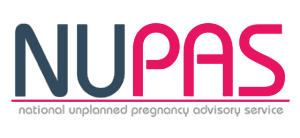NUPAS > Abortion Care > Contraception > Vaginal Ring
A hormonal contraception lasting 3 weeks
The vaginal ring is often known by the brand name Nuvaring. It is a soft, plastic ring that goes into the vagina. It releases hormones called oestrogen and progestogen. The vaginal ring can stay in place for 3 weeks. After 3 weeks, you remove the vaginal ring. You can then have a ‘ring-free’ week before putting in the new vaginal ring. Your period may start during this week. Vaginal rings can be used back-to-back if you want to skip a period.
How does the vaginal ring work?
The vaginal ring releases hormones to stop your ovaries from releasing an egg (ovulating) that month. It thickens the cervical mucus (fluid around the neck of the womb) which stops sperm getting to an egg. It also makes the lining of the womb thinner. This stops a fertilised egg attaching and growing.
When can I start using the vaginal ring?
You can start using the vaginal ring straight away after an abortion. You will be protected from pregnancy immediately.
If you insert the vaginal ring more than 5 days after an abortion, you will need to use additional contraception for the next 7 days.
Advantages, Disadvantages and Effectiveness
All contraception has different advantages, disadvantages and effectiveness. It is important to look at this when finding the right contraception for you.
What are the advantages of the vaginal ring?
What are the disadvantages of the injection?
What are the risks of the vaginal ring?
Possible temporary side effects when first using the vaginal ring are:
- feeling sick (nausea)
- headaches
- increased vaginal discharge
- sore breasts
- bleeding in between periods (spotting).
Other possible side effects include feeling more hungry than usual. The vaginal ring can also cause changes in mood or sex drive.
An extremely rare risk of the vaginal ring is blood clots in the legs or lungs (5-12 in 10,000). Contraception clinics will check your medical history to see if this risk could affect you.
Research suggests that the vaginal ring may cause an increase in the risk of breast cancer and cervical cancer. This risk reduces after 10 years once you stop using the vaginal ring.
For most people, the benefits of using the vaginal ring outweigh the risks.
What makes it less effective?
- Forgetting to replace your vaginal ring.
- If the ring comes out on its own (expulsion).
- Some prescription and complementary medicines.
If any of these things happen, you can get advice on emergency contraception to prevent an unintended pregnancy.
Protection from STIs
The vaginal ring does not protect you from sexually transmitted infections (STIs). We recommend that you also use condoms to protect against STIs. We offer all our patients condoms to take away with them. Get in touch if you’d like advice on the different contraception options after an abortion.
Contraception options available at NUPAS
The vaginal ring is not currently offered as a method of contraception at NUPAS however, at your abortion appointment, we will discuss contraception options with you.
Fertility can come back as soon 5 days after an abortion. This means you could get pregnant again if contraception is not used. There are lots of methods of contraception to choose from so don’t be put off if the first type isn’t quite right for you.
Find out more about contraception options available at NUPAS.
